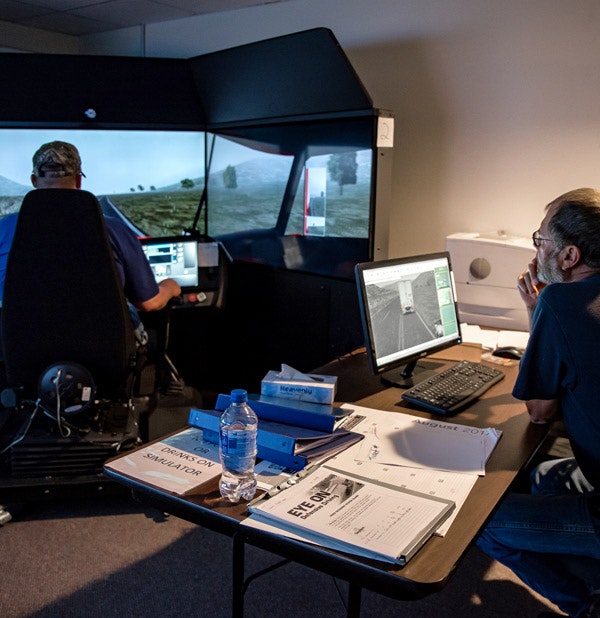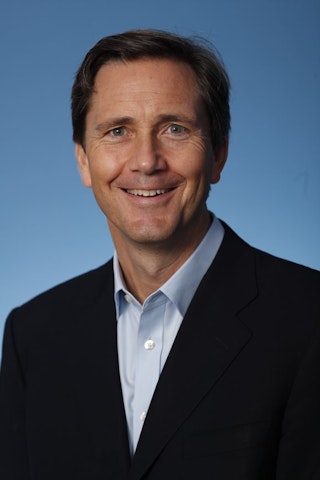Capitalism vs. Socialism is the Wrong Way to Frame Today's Economic Debate
Ryan Streeter and Richard Reeves start from different points on the philosophical spectrum, but they share a common belief: The debate between capitalism and socialism is a false choice. They feel that Americans instead are searching for ways to express their frustration with the workings of capitalism today, not their support for socialism.

Policy experts Ryan Streeter and Richard Reeves have written widely on the subject of the American economics. Streeter has done so as director of domestic policy studies at the American Enterprise Institute, while Reeves has done so as a senior fellow in economic studies at the Brookings Institution, where he directs the Future of the Middle Class Initiative. They elaborate upon their beliefs in making capitalism work for more people in this conversation with Catalyst Editor William McKenzie and Bush Institute-SMU Economic Growth Initiative Director Cullum Clark.
Why are we having a debate over whether capitalism works?
Reeves: A striking number of young Americans and young Democrats say they are more in favor of socialism than capitalism and that tells us a few things. One, they have no idea what socialism actually is. But two, there is a discontent with capitalism. The reason for that is the engine of the economy isn’t delivering for certain groups of people. At least, not like it used to, or as much as they think it should.
There is a general sense of sluggishness. That feeling is sharpened by the fact that the economy does seem to be delivering for those who are supported by the safety net or those who are rich in human capital and seem to be doing well.
Streeter: I would agree with much of that and reemphasize that, among young Americans particularly, we are seeing a collapse in confidence in capitalism more than we are seeing a resurgence in socialism. What people mean by socialism is inexact and probably has less to do with collectivism now than when this was initially surveyed, even after World War II.
This drop in capitalism can’t be disentangled at all from the after-effects of the Great Recession. For some people, their incomes have not grown at a satisfying pace. They don’t feel like they are able to get ahead in the way they understand their parents or grandparents did.
“I would … reemphasize that, among young Americans particularly, we are seeing a collapse in confidence in capitalism more than we are seeing a resurgence in socialism.”
-Ryan Streeter
Second, geographic dynamics play a role. In some parts of the country, entire towns and regions have not experienced the kind of growth and prosperity that you’ve seen in more highly urban metro areas. There’s this awareness that people with high levels of income, high levels of education, access to culture-creating institutions, and connectivity to political power tend to be the people who are getting ahead while those of us who are hardworking in the heartland aren’t seeing that kind of gain.
This second point can largely explain the collapse of confidence in capitalism that you are seeing on the American right. That is a relatively new thing.
Is this debate between capitalism and socialism a false choice?
Reeves: Yes. People are just trying to find the language to express their unease, disappointment, and dissatisfaction. Socialism provides that, although I don’t take it seriously that people actually mean they want socialism.
Even Bernie Sanders, the candidate most associated with the term “democratic socialist” and who is saying we should be more like Denmark, was publicly asked by Denmark’s prime minister to stop saying that. It was damaging their brand.
 Danish Prime Minister Lars Løkke Rasmussen at the Institute of Politics at Harvard's Kennedy School in 2015, where he explained that Denmark is not a socialist country. <a href="https://www.youtube.com/watch?v=MgrJnXZ_WGo" target="_blank">Watch video</a> (Harvard Kennedy School of Politics)
Danish Prime Minister Lars Løkke Rasmussen at the Institute of Politics at Harvard's Kennedy School in 2015, where he explained that Denmark is not a socialist country. <a href="https://www.youtube.com/watch?v=MgrJnXZ_WGo" target="_blank">Watch video</a> (Harvard Kennedy School of Politics)
The term “socialism” is meaningful in the sense of what it is trying to express, but it is a horrible framing of the debate. No one in this debate seriously thinks the government should be taking command of the modes of production. Sometimes labels become unhelpful.
Streeter: I agree. The debate we are really having, but is overshadowed by the media’s attention on socialism v. capitalism, is about the institutions and structures of capitalism itself. That’s precisely why Denmark and the other Nordic countries don’t necessarily want to be called socialist. They view themselves as a hybrid between a highly-capitalist society and an economy that has very generous welfare systems. That’s not the same thing as socialism.
The debate we should be having is about what a free-market capitalist society looks like when it is struggling with certain inequities and injustices and trying to remedy those problems.
“The debate we are really having, but is overshadowed by the media’s attention on socialism v. capitalism, is about the institutions and structures of capitalism itself.”
-Ryan Streeter
Reeves: I want to underline what Ryan said: Confidence in capitalism is really the issue, but it is a difficult problem. The psychological scars of the recession and sense of disappointment are greater than perhaps the economic loss. The real enemy of capitalism is not socialism; it is pessimism.
If you start to lose the sense that the future is going to be better largely as a result of your own effort and investment, then you don’t do the things to make it better. You don’t invest in your education, you don’t move, and you don’t risk starting a business. You become more fatalistic and pessimistic. That is really what we are talking about here.
“The real enemy of capitalism is not socialism; it is pessimism.”
-Richard Reeves
I also want to underscore Ryan’s point about the growing geographical inequality. We used to have a more centrifugal capitalism. The opportunity to expand was quite well dispersed spatially because you moved to where it was cheaper to do business.
Today, we are seeing the opposite, a centripetal capitalism. More power is being concentrated in specific companies and areas. That’s why you get this sense of people who are being left behind. Instead of thinking about the distributional aspects of capitalism across income, the more important distributions today are across firms and communities.

Are the lives of young adults all that different from what went before? High student debt and high housing prices are two objective measurements. But what is different about the world that is shaping these attitudes in new ways?
Streeter: First, I do think some of the reporting about the pessimism among young adults about America’s future is a bit exaggerated. In our survey research, young adults — Millennials, Gen Xers, and Gen Zers — are a little more bullish on whether or not they are going to achieve the American Dream, however they define it, than has been recorded.
Having said that, people entering the workforce after the Great Recession suffered a collective psychological trauma. That has reduced confidence in institutions that typically support things like entrepreneurship and playing by the rules and working hard so you will have a better life than your parents. A pervasive timidity exists.
Creating greater forms of security is understandable given the collective trauma. But I worry that we are moving our policy in a way that privileges security over other things that a dynamic society and economy require.
The concepts of a dynamic life and economy have not been part of our political rhetoric or public debate for some time. We have a cohort of young adults entering the work force who don’t see self-employment, entrepreneurship, risk-taking, moving around, and jumping from firm-to-firm as something desirable.
I worry most about that lack of dynamism. This is one of the bigger challenges this generation faces.
Reeves: I do a lot of work on mobility. In our surveys, people say that security is important to them. I wish people were more interested in mobility, but they want security. That spells potential trouble for capitalism.
As a recovering European, my worst fear is that you end up with a European mindset – less risk-taking, less dynamic, and less willing to move – without the European welfare state and its strong safety net. There’s a danger that America sleepwalks into a European mindset with a continued Americanization of its welfare system. That’s quite dangerous.
“In our surveys, people say that security is important to them. I wish people were more interested in mobility, but they want security. That spells potential trouble for capitalism.”
-Richard Reeves
Thinking about policies here, how do more American workers get access to good wages, capital, information technologies, or jobs with mobility?
Streeter: I want to first focus some more on the theme of dynamism because it seems so unpopular now among people on the right. Before we look at sources of government support for education and mobility, it is worth looking at some dynamics at play in new young firms. Today, compared to the 1980s, about half the rate of all firms are young, meaning they are under, say, three-years old. Fewer people are working for smaller firms where they know the founder.
It has always been a minority of all firms, but previously we had people who were not just MBAs or living in tech-centric metro areas who were able to create, build, and grow companies. The wages that come from these firms are not bad. The loss of dynamism translates into some of the problems with lower wages and certain stagnation, at least in some sectors of the economy.
Now, about policies, we should try to remove the barriers to more big-firm creation, particularly for people who do not have sophisticated levels of education. I don’t want to be Pollyanna-ish about entrepreneurship and self-employment, but there comes a tipping point in a society where collectively people begin to not desire that type of economic environment. I pray we have not passed that point.
I am drawing from the work of Nobel Laureate Edmund Phelps, who said this better than anyone. The dynamism that we saw in Europe in places such as Germany, France, and Britain, and that the United States has enjoyed, can go through the cycle of seeking security. When that happens, you lose the dynamism that has a direct effect on people’s aspirations and their ability to earn a higher income.
Promoting a dynamic engagement with the economy would mean doing things like changing occupational licensing and making non-competing clauses in contracts more difficult. I would like to see things start there.
That said, there is a worthy debate to be had about whether and what level of wage subsidy in addition to the Earned Income Tax Credit we should embrace, if we should embrace it at all. How can we make hourly wages better so people can earn more and support their families better?
But there is no substitute for giving more people access to information about the best opportunities in the regional economy and how they can get the training and education they need to pursue those opportunities. We have been failing on those two fronts for some time.
Reeves: An interesting exception to Ryan’s point about new businesses, which is exactly right, and the significant drop in mobility is that immigrants are more willing than native-born Americans to take the risk of physically relocating for work. They are more likely to move and start their own businesses. They also are more focused on getting their kids a good education.

Those are very strong American values. You could make the argument that new Americans are actually the true Americans, and that the renewal you get from immigration provides a dynamism that shouldn’t be left out of debates over immigration.
About wage subsidies, the big question is the extent to which we expect that the current structure of the labor market means that significant and possibly growing government subsidies of wage earners will be required.
I wish it wasn’t like that, but I think it is true. And I think it’s true because some workers are not getting paid enough because they are not productive enough, which also is kind of true. So you make them more productive with more education and training. But we have been saying that for about 30 years and not doing it very well. We have an underinvestment in human capital, particularly for poorer and middle-class Americans.
The decline in trade unions, along with monopoly power and a reserve army of potential workers, means workers don’t have much bargaining power. Absent a productivity miracle we have been promising for a generation or a serious rebalance in the power relationships, I think we are stuck in a world where there is no choice but to redistribute directly to wage earners.
In one way or another, each of you have written about the concept of lifelong learning. How do we do a better job training and retraining workers for jobs?
Streeter: We have the ability to find the best Thai restraint in the neighborhood more easily than we know where we can learn about a particular trade and where the outcomes are pretty good. That is crazy because the data largely exists, particularly at the state level. It can show us what employers are willing to take in terms of skills.
But because of the way state apparatuses work, we just haven’t been able to get that data to consumers, except in a few places like Texas and Tennessee. People could use this information not just when they are leaving high school or determining which community college to attend, but also when they are 45-years old and thinking about a career change.
 An instructor watches as a person operates a truck driving simulator at the Iowa Central Community College Transportation Technology Center in Fort Dodge, Iowa, in July 2018. (Sergio Flores/Bloomberg via Getty Images)
An instructor watches as a person operates a truck driving simulator at the Iowa Central Community College Transportation Technology Center in Fort Dodge, Iowa, in July 2018. (Sergio Flores/Bloomberg via Getty Images)
Typically, when people of higher levels of education are exploring a career change, they have all kinds of information available to them through extended networks, including beyond their geographic region, and through social capital. But the lower the level of your education, the less expansive are your networks.
I am not a tech utopian, but using technology to provide much better real-time information to people is really important.
Reeves: I banned the term, “lifelong learning,” from my vocabulary. That is probably because I’m sick of hearing myself say it and because we have been talking about it for so long. That is a very strong thing to say but I am also criticizing myself.
We have spectacularly failed to deliver on it. You could create individual lifelong learning accounts and put money into those for people to use, which is much better than making college free. Rather than put it into institutions that may not be so great, why not be flexible and make it available to the person so they can use it later in their lives? Apprenticeships are most valuable to people in their 40s or 50s because apprenticeships are done on the job and can help you retrain.
Of course, we do need a much a greater investment in community colleges and accompany that with hyper accountability. Community colleges reach younger people and middle-class kids.
Are the answers to these challenges we are talking about rooted more in policies or in attitudinal shifts? And is something like dynamism more likely to originate at the local level, such as the creation of small businesses?
Reeves: Thomas Jefferson wrote in the first draft of the Declaration of Independence that all men are created “equal and independent.” The independent part got edited out, which I regret in a way. Independence is a powerful part of American DNA, but we are now seeing bipartisan pessimism. We see the politics of blame on both sides, rather than creating aspirations. Policy flows from those mindsets.
Yes, we want dynamism, but certain kinds of welfare support free markets. For example, they free employers and employees from the fear that you will be in real trouble if not everything works out. An example is Britain’s national health care system. You know you still will have health care if the business doesn’t work out.
Federal laws like catastrophic health insurance can take care of anxieties, while opportunity and dynamism comes from the local level, such as workforce development and K-12 education. The government can underwrite opportunity by providing security.
Streeter: The answer is both-and. Policy affects culture/behavior and culture/behavior affects policy.
There is a way to balance opportunity and security in a way that affects how people make choices. We first have to think what kind of people we want to be. And we want to keep a forward-looking, aspirational element to our policies. We need to keep thinking about the cultural impact of the policies we are designing.
The Catalyst believes that ideas matter. We aim to stimulate debate on the most important issues of the day, featuring a range of arguments that are constructive, high-minded, and share our core values of freedom, opportunity, accountability, and compassion. To that end, we seek out ideas that may challenge us, and the authors’ views presented here are their own; The Catalyst does not endorse any particular policy, politician, or party.


